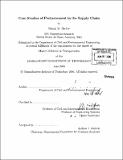| dc.contributor.advisor | Yossi Sheffi. | en_US |
| dc.contributor.author | Rietze, Susan M. (Susan Marie) | en_US |
| dc.contributor.other | Massachusetts Institute of Technology. Dept. of Civil and Environmental Engineering. | en_US |
| dc.date.accessioned | 2006-11-07T13:33:02Z | |
| dc.date.available | 2006-11-07T13:33:02Z | |
| dc.date.copyright | 2006 | en_US |
| dc.date.issued | 2006 | en_US |
| dc.identifier.uri | http://hdl.handle.net/1721.1/34601 | |
| dc.description | Thesis (S.M.)--Massachusetts Institute of Technology, Dept. of Civil and Environmental Engineering, 2006. | en_US |
| dc.description | Includes bibliographical references (p. 85-88). | en_US |
| dc.description.abstract | The thesis addresses the growing trend in business to offer a wide variety of products while maintaining customer order fulfillment expectations. This trend is happening at the same time the US is losing manufacturing jobs to overseas labor markets, namely China, India, and Central America. While it may not be possible for the US to compete with these countries on the basis of labor costs or even quality in manufacturing, it can compete in the area of faster delivery times and product-service interaction which must inherently take place onshore. Postponement is a strategy that allows businesses to take advantage of the offshore capacity and labor for manufacturing in addition to local finishing centers for final assembly, packaging, and distribution. Postponement is widely used in the automotive, apparel, and consumer electronics industries. Many companies produce products that are candidates for postponement but are unlikely to undergo the implementation changes necessary to support it. This thesis highlights some of the leading companies who are pioneers of postponement and includes case studies of additional companies who have followed their lead. | en_US |
| dc.description.abstract | (cont.) They have seen the tangible benefits of lower inventory costs, quicker response time, better forecasts, and more variety as well as the intangible benefits of better customer service and the coordination and integration of manufacturing, sales, and marketing functions. The assortment and range of case studies suggest that postponement is used across a breadth of industries and not only profitable as a business strategy but also as a means for creating local jobs because of the inherent product-customer interaction. | en_US |
| dc.description.statementofresponsibility | by Susan M. Rietze. | en_US |
| dc.format.extent | 88 p. | en_US |
| dc.format.extent | 4581073 bytes | |
| dc.format.extent | 4585433 bytes | |
| dc.format.mimetype | application/pdf | |
| dc.format.mimetype | application/pdf | |
| dc.language.iso | eng | en_US |
| dc.publisher | Massachusetts Institute of Technology | en_US |
| dc.rights | M.I.T. theses are protected by copyright. They may be viewed from this source for any purpose, but reproduction or distribution in any format is prohibited without written permission. See provided URL for inquiries about permission. | en_US |
| dc.rights.uri | http://dspace.mit.edu/handle/1721.1/7582 | |
| dc.subject | Civil and Environmental Engineering. | en_US |
| dc.title | Case studies of postponement in the supply chain | en_US |
| dc.type | Thesis | en_US |
| dc.description.degree | S.M. | en_US |
| dc.contributor.department | Massachusetts Institute of Technology. Department of Civil and Environmental Engineering | |
| dc.identifier.oclc | 71271545 | en_US |
